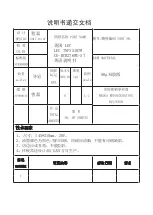
TROUBLESHOOTING
36
PROBLEM
POSSIBLE CAUSES
SOLUTIONS
Off-taste, odor, or gray
color in the ice or water
Newly installed refrigerator requires
flush of water system.
Flush the water system. See the “Water and Ice Dispensers”
section for water system flushing instructions.
Recently installed or replaced
plumbing connections. New
plumbing connections can cause
discolored or off-flavored ice and
water.
Discard ice and wash the ice storage bin. Flush the water system
with 3 gal. (12 L) of water. Allow 24 hours for the ice maker to
make new ice and discard the first 3 batches of ice produced.
Using a water supply connection type
other than recommended
It is recommended to use copper tubing or Whirlpool
®
supply
line, Part Number 8212547RP. See the “Connect the Water
Supply” section.
The ice has been stored too long.
Discard ice and wash ice storage bin. Allow 24 hours for ice
maker to make new ice.
The water has been stored too long.
Dispense at least 1 qt (1 L) of water per week to maintain a fresh
supply.
Odor from stored food has
transferred to the ice.
Use airtight, moisture-proof packaging to store food.
There are minerals (such as sulfur)
in the water.
A water filter may need to be installed to remove the minerals.
There is a water filter installed on the
refrigerator.
Gray or dark discoloration in ice may indicate that the water
filtration system needs additional flushing. Flush the water
system after installing and before using a new water filter. See
the “Water and Ice Dispensers” section for water filter flushing
instructions.
The water filter needs to be replaced. Replace the disposable water filter at least every 6 months or
when indicated. See “Water Filtration System.”
The water and ice
dispenser will not
operate properly.
The refrigerator is not connected to
a water supply or the water supply
shut-off valve is not turned on.
Connect the refrigerator to the water supply, and turn the water
shut-off valve to fully open.
There is a kink in the water source
line.
A kink in the water line can reduce water flow from the water
dispenser and result in hollow or irregular-shaped ice. Straighten
the water source line.
The refrigerator has just been
installed.
Flush and fill the water system. See the “Water and Ice
Dispensers” section.
The water pressure to the house is
not at or above 35 psi (241 kPa).
The water pressure to the house determines the flow from the
dispenser. See the “Water Supply Requirements” section.
A reverse osmosis water filtration
system is connected to the cold
water supply.
A reverse osmosis water filtration system can decrease water
pressure. See the “Water Supply Requirements” section.
The water filter may be clogged.
Remove the water filter and operate dispenser. If water flow
increases, your filter is clogged and needs to be replaced.
See the “Water Filtration System” section.
The water filter is installed incorrectly. Remove the water filter and reinstall. See the “Water Filtration
System” section.
The refrigerator door or freezer
drawer is not closed completely.
Close the door or drawer firmly. If it does not close completely,
see “The doors will not close completely” section.
The refrigerator doors were recently
removed.
Make sure the water dispenser wire/tube assembly has been
properly reconnected at the top of the refrigerator door. See
“Remove and Replace Refrigerator Doors” section.
Ice is clogged in the ice storage bin
or ice is blocking the ice delivery
chute.
Remove the ice clogging the storage bin and delivery chute,
using a plastic utensil if necessary. Clean the ice delivery chute
and the bottom of the ice storage bin using a warm, damp cloth,
then dry both thoroughly. To avoid clogging and to maintain a
fresh supply of ice, empty the storage bin and clean both the
storage bin and delivery chute every 2 weeks.






































